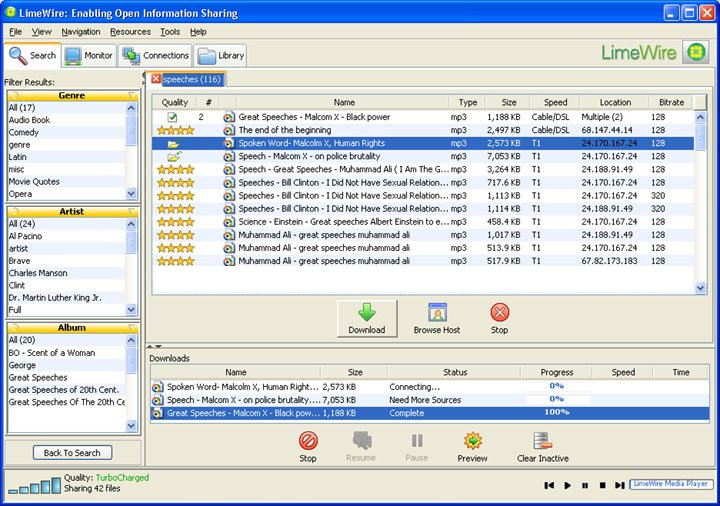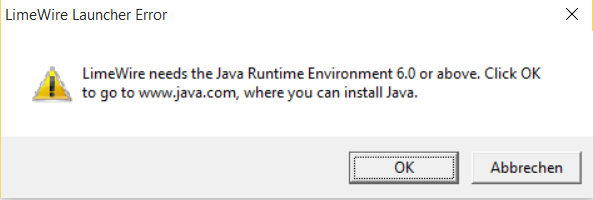Based on the Gnutella protocol, Limewire was one of the best known file sharing clients. Initiale released in 2000, it was available for Windows, Mac and Linux, and was dominantly used to download music, although BitTorrent support was added later, too. After a long battle in court, they finally gave way in 2010 and disabled all newer versions using a backdoor, making it impossible to use the client. Older versions still seem to work, although they’re seriously outdated and have severe connection problems.
A continuation of the project has been released by independent developers: Under the name Limewire Pirate Edition and later, Wireshare, the software was resurrected.
Pirate Edition and Windows 7, 8, 10: Java Problems
As the “Pirate Edition” is not updated anymore, there is almost no way to get it to work without installing a seriously outdated version of Java, which we cannot recommend at all since it it very dangerous to use anything but the latest version of Java. When trying to install and start the software, this is what happens on a modern computer:
Also, a connection fix is needed, which was developed by an anonymous programer but isn’t updated anymore. Without it, it is not possible to connect to the network, except of course the BitTorrent network. However, since there are a number of better torrent clients on the market, it is practically a useless piece of software without the original Gnutella compatibility (more on that later). If you still want to connect to this network, we recommend you to either use Wireshare or Shareaza.
How it used to look and work
The software connects to the Gnutella network, a network which has no central servers and was one of the big new players after Napster folded in 2001. Using the uploading bandwidth of users, as all traditional p2p file sharing networks do, it makes users into a distributor of the files, resulting in problems with “copyright trolls“, sueing or sending “warnings” in case you allegedly download anything protected by copyrighted without permission. We absolutely recommend anyone to use a VPN to eliminate any risk of getting tracked.
Other than that, it was fast, reliable and very easy to use. Upon installing the software, it took a few seconds to several minutes to connect, after which you could use the search to find files and download them. That was all that was to it, and one of the reasons why it became so popular so quickly. Mostly used for single MP3s and smaller files, it allowed people of slow connections to still get the content they wanted, without having to download the whole album.
 (Limewires search window. Image source: Unknown)
(Limewires search window. Image source: Unknown)
Disadvantages of the Gnutella network: Fakes and viruses!
As one of the plattforms not using verification sites like torrents do, you could just find files using the search. This opened the doors for rogue files, mostly consisting of three kinds: Viruses, fakes, and mislabled files.
The first kind is the most dangerous. Basically, you should avoid any executable file, document, basically anything that isn’t a media file. One false click and you get infected with some annoying backdoor, stealing your banking information or connecting you to a botnet. Not what you want, especially when considering that a lot of other sources on the Internet provide software that is more up to date than the stuff you can find on Gnutella.
Fakes are MP3 that have been manipulated by the copyright industry: They only contain a small part of the track you’re looking for, or are completely garbled. You’ll know when you download one, trust us. Try not to be too annoyed, there will be a better version if you look closely at the search results.
Mislabled files are annoying, but harmless: Most notorious are porn flicks that have been renamed to look like Hollywood movies or something else. Be careful to check the WHOLE video file before showing them to your kids though: According to some source, Some really annoying trolls take the first few minutes of film and mix it with porn in the middle. Yikes!
Our verdict: Better look someplace else.
If you enjoy using outdated and slow file sharing networks that are rather difficult to use and almost dead by now, by all means try Limewire (or Frostwire, the ad-free version of it). Also it has some “retro” charm for old school P2P users. For everyone else, there are better options.
The only use we see for it these days is as a backup in case you cannot find what you are looking for on other platforms, or if you somehow found a liking to the software.
Hat tip: Multi-network clients like Shareaza and MLDonkey also support the Gnutella network, and may be better for users who don’t like installing a year-old and non-updated Java software from one of the often dubious sources you find it in 2019.




